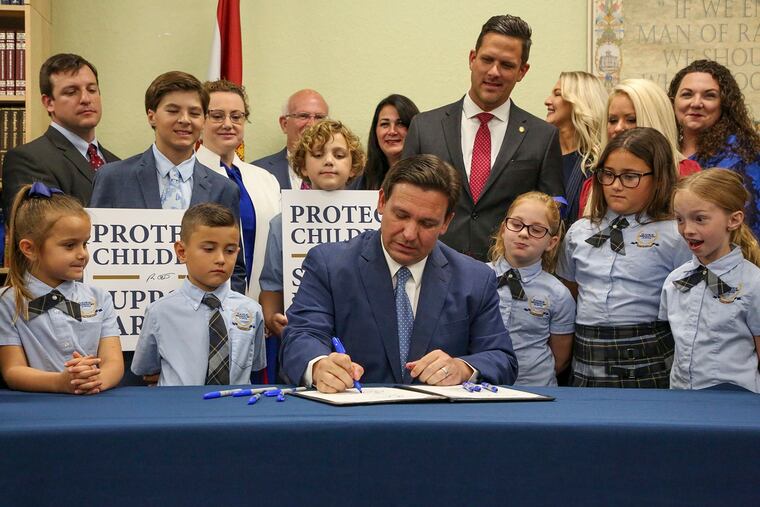Ron DeSantis defines ‘intersectionality’ differently than everyone else does ... including the dictionary
The right already conquered "woke." Logically, "intersectionality" is next. Here's what the word actually means.

You’re about to start hearing about intersectionality. A lot.
My anticipatory condolences.
The right already conquered woke. Logically, intersectionality is next.
Evidence for woke’s defeat is blazing across Merriam-Webster’s homepage, where — as I write this — woke is currently, and frequently, the most looked-up term. Why? Many politicians and pundits, who would rather be asleep than woke, often struggle to define it. Some have even launched a yearslong campaign of obfuscation and appropriation, leaving people rightly confused about what woke means. So they look it up a lot.
I’ve written previously about how the right stole woke and turned it into a derisive insult. A surge in national conversations about antiracism in recent years provoked a desire for an anti-antiracist response that didn’t sound so … racist. Woke — with its shifting parts of speech and malleable definition — provided an opening.
Now it’s intersectionality’s turn.
» READ MORE: How ‘cultural Marxism’ and ‘critical race theory’ became dangerously misunderstood | The Grammarian
“We want education, not indoctrination,” Florida Gov. Ron DeSantis said at last month’s news conference where he announced the cancellation of that state’s Advanced Placement African American history courses. “And so when you look to see they have stuff about intersectionality, abolishing prisons, that’s a political agenda.” Never mind that intersectionality has nothing to do with abolishing prisons. For DeSantis, the word’s actual definition is unimportant.
Unlike woke, whose origins lie in folk music, intersectionality comes from academia, and is much newer. Kimberlé Crenshaw, a Columbia Law School professor, coined the word in a very academic-sounding 1989 paper called “Demarginalizing the Intersection of Race and Sex: A Black Feminist Critique of Antidiscrimination Doctrine, Feminist Theory and Antiracist Politics.”
Think DeSantis has read it?
For DeSantis, the word’s actual definition is unimportant.
The Oxford English Dictionary — which defines intersectionality as “the interconnected nature of social categorizations such as race, class, and gender, regarded as creating overlapping and interdependent systems of discrimination or disadvantage; a theoretical approach based on such a premise” — added the word in 2015. Merriam-Webster followed in 2017 with a definition that’s slightly more accessible: “the complex, cumulative way in which the effects of multiple forms of discrimination (such as racism, sexism, and classism) combine, overlap, or intersect especially in the experiences of marginalized individuals or groups.”
Just a few years later, as Google search trends and mentions in books and even the briefest glances at Fox News show, intersectionality is on its way to ubiquity.
An abstruse academic term (like, say, critical race theory, which we’re sadly not done hearing about) is perfect fodder for this kind of manipulation. Take something that most people don’t understand — and that they probably won’t bother to educate themselves about — and label it the boogeyman du jour. Then twist its meaning to be whatever you like, and use it as a cudgel.
As we’ve seen before, it’s an effective strategy.
That’s not to say the rest of us have to just roll over. Take Florida State Sen. Shevrin Jones, for example, who told MSNBC last weekend that Florida residents showed the true definition of intersectionality at a recent march against DeSantis’ policies. “People from all over the state of Florida joined in unity and solidarity to make it clear that if you come for one of us, you come for all of us. From students and parents, Black, white, gay, straight, transgender, and all types of religions, they all were there on Wednesday.”
Not a perfect definition, but we’ll take it. Maybe DeSantis — and the students he’s deliberately trying to undereducate — will end up learning something after all.
The Grammarian, otherwise known as Jeffrey Barg, looks at how language, grammar, and punctuation shape our world, and appears biweekly. Send comments, questions, and circumlocutions to jeff@theangrygrammarian.com.